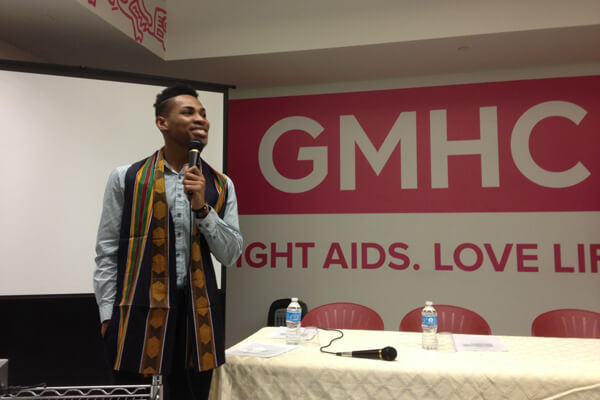Javier Núñez Florián, Dariel Arrechaga, and Anailín de la Rúa de la Torre in Lucy Mulloy’s “Una Noche.” | IFC FILMS
The absorbing Cuban drama “Una Noche” tells the story of three teenagers — Lila (Anailín de la Rúa de la Torre), her gay twin brother, Elio (Javier Núñez Florián), and Raul (Dariel Arrechaga), Elio’s friend (and crush) — who employ a homemade raft to travel the 90 miles from the island nation to Miami. In a phone interview, writer and director Lucy Mulloy, who spent considerable time in Cuba, explained her reasons for making “Una Noche.”
“I was interested in telling a story of teenagers who left on a raft at dawn one day,” she said. “The characters are based on people I kind of know and impressions I wanted to create.”
Mulloy was interested in the situation of three people brought together by a common purpose who all come to really care about each other. Elio is the fulcrum of the trio.
“He’s the heart of the film,” Mulloy said. “And he cares the most for both of them. They kind of fail to see that.”
Lucy Mulloy charts the stormy emotional waters confronting three young Cuban exiles
Early on, “Una Noche” only hints at Elio’s sexuality. In a voiceover, Lila observes that her brother has “changed,” becoming more secretive since he met Raul. Elio and Raul share a camaraderie that is brotherly, but the film does not overplay the bromance angle. When Elio is biking with friends, he remains silent while his buddies taunt an effeminate boy, calling him “faggot.”
“I wanted to show Elio as a young man, and not as a gay man who is labeled with prejudices from the beginning,” Mulloy said, when asked about the decision to make his sexuality explicit only late in the film. “It depends on the [viewer’s] level of sensitivity, as to where it’s exposed. Most people clock into it when he’s on the bike.”
Presenting the homophobia in Cuban society was one of the filmmaker’s aims. When Raul, horny, unknowingly comes on to a transgender prostitute, he becomes incensed when he discovers “her” penis.
Lila’s lack of sexual experiences parallels her brother’s unacknowledged gay identity. A subplot involves her spying on their father and discovering he is having an affair, something that contributes to her desire to leave Cuba.
Saying, “Cuba is so sexual,” Mulloy explained, “There is a tendency to have young people really aware of their sexuality, and I wanted to have Lila on the other end of the spectrum.”
The handsome Raul is emblematic of the opposite end. He uses his good looks to charm a young woman to give him the inner tubes the trio needs to cross to Miami. Another woman he flirts with provides him with a camera that he trades to get the HIV medicine he needs for his mother (Maria Adelaida Méndez Bonet), a prostitute.
Mulloy maintained that bartering sex for money or favors — as Raul and his mother do — is a commonplace of Cuban life.
“I would not identify it with the culture but as a necessity and desperation that exist,” she said. “When people are reduced to having very little, they have to be resourceful. You have your body, and circumstances have led Raul to do this. I think it’s more a product of being under those circumstances and getting by in order to survive.”
Raul becomes eager to leave Havana after he injures a tourist client of his mother’s during an altercation and is hunted by the police, who, according to Mulloy, “are very vigilant — especially if a crime is associated with a tourist.”
Much of what takes place in “Una Noche,” including Elio and Raul’s visit to a Santería priest, is informed by things Mulloy saw in Cuba.
“I’ve been to Santeros, and it’s an interesting experience,” she said. “Folks go before they attempt to leave the country to ask if it will work out. I wanted the characters to go because it’s so visceral. I had a Santero spit in my face. I wanted to incorporate that to make the rich tapestry of this world as specific as I could, so folks could get a sense of what it’s like there. It’s important to me as a filmmaker to portray images that people don’t normally see.”
Mulloy duly captures the oppressive qualities that constrain the lives of her characters — whether from poverty, the legal system, or just the heat. The grittiness of the film, she said, reflects the realities of Cuba, though she admitted that creating that often relied on movie magic.
“We were spraying the actors with sweat because we actually shot when it wasn’t so warm,” she said. “We had a makeup artist giving the characters sunburn. We wanted to convey being almost asphyxiated by the heat and sweat, when you labor through the day, because it’s so hot — which is the feeling you get in Cuba in the summer.”
That feeling is manifest in the tensions faced by the characters — tensions that are both emotional and sexual — particularly when they drift toward Miami. This extended sequence, the last third of the film, is gripping, and viewers will find themselves caring deeply about the fate of the characters. Actual details of “teenagers in the middle of the ocean who are completely terrified” helped Mulloy craft the film’s ending, she said.
What happens to Lila, Elio, and Raul, however, is best left for viewers to discover for themselves in this film that makes their stories come vividly to life.
UNA NOCHE | Directed by Lucy Mulloy | IFC Films | Spanish with English subtitles | Opens Aug. 23 | IFC Center, 323 Sixth Ave. at W. Third St. | ifccenter.com







